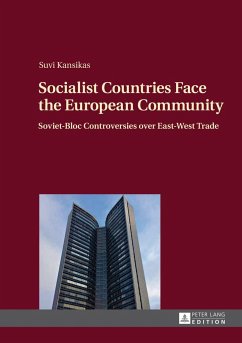In the early 1970s, the Council for Mutual Economic Assistance (CMEA) began to revise its trade policy towards the outside world. It needed to counter the European Community's bid to implement its Common Commercial Policy and thereby change East-West trade practices. Foreign trade priorities became at once a crucial issue on the socialist countries' political agenda. The key question was whether they would have to open their system to the global economy - and bear the consequent pressures and competition that this decision entailed. Based on newly declassified archival sources, this study shows how the East European states were able to lobby their positions towards the USSR within the CMEA. The pressure from its allies forced the Soviet leadership to accept the CMEA's opening towards the EC.
«Kansikas has very profitably reminded us the politically important role commerce played in knitting the continent back together again after its division in the 1940s, and has advanced our understanding of the ways in which technology and economic organization constitute and truncate political power.»
(Oscar Sanchez-Sibony, Slavic Review, vol. 75, no. 3 2016)
(Oscar Sanchez-Sibony, Slavic Review, vol. 75, no. 3 2016)








